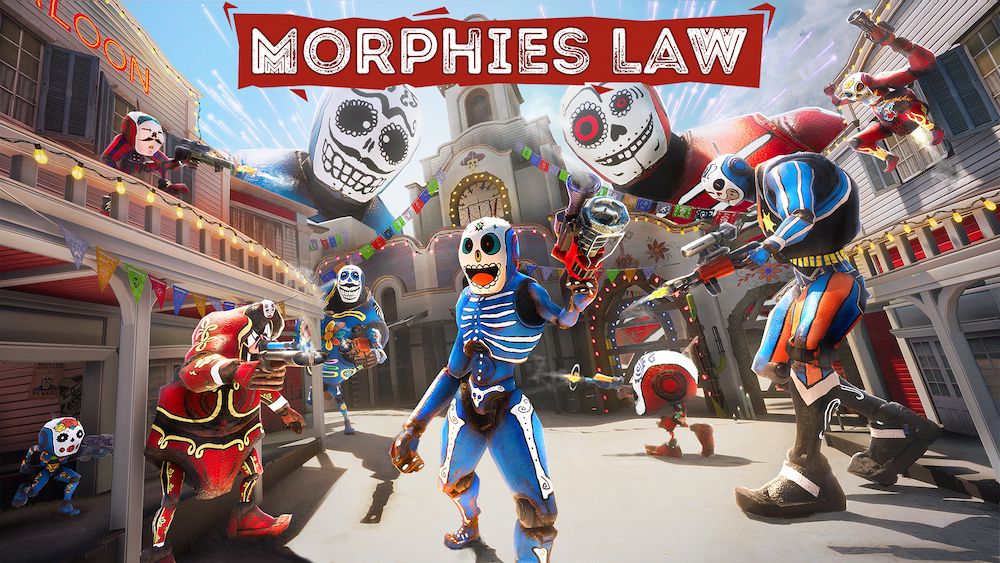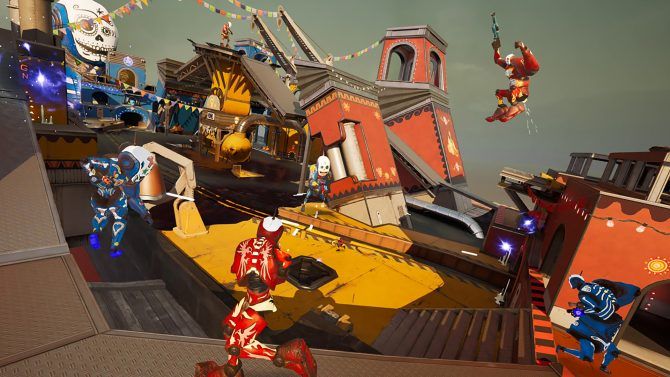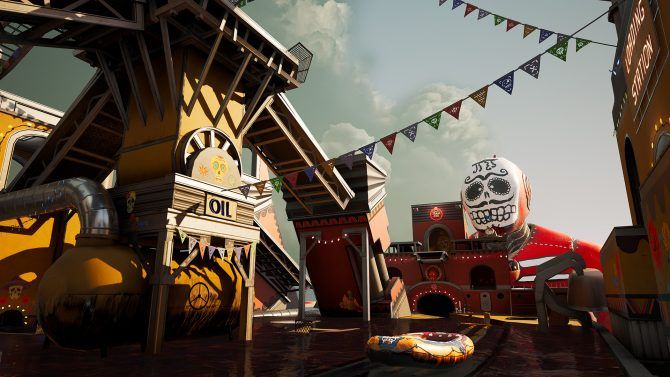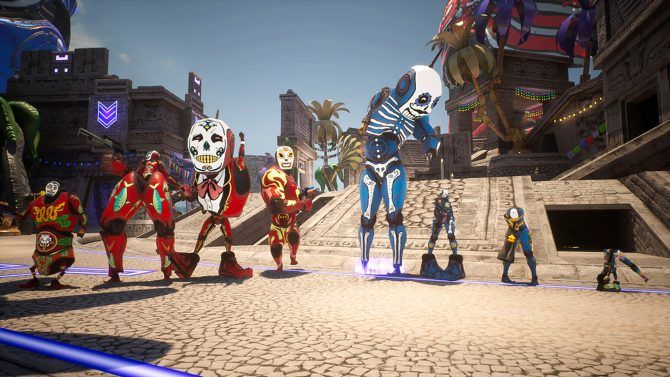Every piece of media has found inspiration from something else—some wear its inspirations proudly as a homage, but some conversely come across as cheap knock-offs. It's difficult to find original video games in what can be considered to be an oversaturated market, but every once in a while, a triple-A company like Nintendo will put out a fresh game like Splatoon. Morphies Law, a third-person shooter from indie developer Cosmoscope GmbH, comes across as a knock-off Splatoon.
Of course, that probably isn't giving Morphies Law enough leeway—the premise is very different from Splatoon, but it's an underlying philosophy that the two games share. Rather than being focused on mowing down every opponent that you see, both games are purely objective-based, with a colorful, smooth art style. The difference here is that while Splatoon involved manipulating the game environment, shooting the floor and walls not only to score but to navigate the space easier, Morphies Law is all about manipulating each other's character models for a similar purpose.
[pullquote]"It's difficult to find original video games in what can be considered to be an oversaturated market, but every once in a while, a triple-A company like Nintendo will put out a fresh game like Splatoon. Morphies Law ... comes across as a knock-off Splatoon."[/pullquote]
The gimmick of Morphies Law involves mass: the player will shoot at an opposing player, and gain their mass. Say you shoot someone in the right leg—as a result, their right leg will shrink, and yours will grow. The result at the end of each 4v4 match is eight players, all of various sizes and proportions, running around. Players take control of robots called "Morphies," all with particularly round body parts—these Morphies will look absurd after even just a single gunfight, but these changes don't just affect you aesthetically.
Whether your character is bigger or smaller than usual, there are both advantages and disadvantages. Having bigger legs, for example, will enhance your jumping abilities, and having a more massive chest will increase health. On the other hand, being smaller after taking damage will make you much harder to hit by larger players. There is a minimum and maximum size that players can have, so it isn't like one can keep growing to building-size, or shrinking to ant-size. Shooting at players who still have mass will heal you; as a result, being as tiny as possible does have the advantage of denying enemies more health. Not to mention, being small will help you fit through certain doorways or travel through pipes.
I played Morphies Law on the Nintendo Switch, and the game had motion and tilt controls very similar to that of Splatoon. I've always been a fan of the controls there, and Morphies Law does the same quite decently. Just don't use those controls in handheld mode—it's a disorienting experience, moving your character by tilting the very screen that you're looking at. While this game also has a button to reset camera view, it didn't work quite as well as in Splatoon, and I stuck with dual analogs in handheld mode as a result. And alongside all of the gameplay mechanics mentioned above, Morphies can use a butt jetpack—holding the jump button will have your robot buddy fart to gain some air. It's quite stupid.
[pullquote]"Morphies will look absurd after even just a single gunfight, but these changes don't just affect you aesthetically."[/pullquote]
Morphies Law has three distinct game types, all variations of familiar game modes that one would expect from a shooter. Morph Match can be compared to a standard Team Deathmatch type, but instead of racking up kills, your team is attempting to gain as much mass as possible. This is indicated by your team's Avatar, a giant Morphie that stands outside of the map. The bigger you and your team are, the bigger your Avatar is, and the team with the largest Avatar emerges victorious.
Head Hunt acts like capture-the-flag mode—both Avatars have lost their head, and the two teams will fight for control of one head on the map. The mass-changing comes into play with carrying that head: the bigger the player is, the easier it will be for them to carry it. In the few times I played in this game mode, I was surprised to see how quickly matches went—without multiple rounds, some games ended in just around one minute.
Finally, Mass Heist was reminiscent of any sort of bank or "deposit" game type in other shooters. Players will have to get to the other side of the map, shoot the opposing team's Avatar to gain mass, and then deposit your mass onto a "mass alter" to donate to your Avatar. This game can be played online with other players, through local wireless, or against AI-controlled enemies. All matches across all game types end with a scene of one Avatar defeating the other, visualizing all of the work your team had just done—not unlike the Judd and Lil' Judd animation at the end of every round of Splatoon.
But it isn't just Splatoon that Morphies Law draws from—it contains multiple conventions from the shooter genre, with perks, loot boxes, and character customization. Players can unlock and choose between different "plugins," similar to Call of Duty perks, at the beginning of matches, each one applied to a different body part of your character. For example, the chest plugin is "Discomfort Zone," creating a protective barrier that gets stronger the bigger your chest is.
Loot boxes come in the form of piñatas and, like Overwatch, are obtained by leveling up and contain cosmetic items. These cosmetics consist of body parts for your Morphie, all simple skin changes. Players can choose between different faces, bodies, and emotes—and that's pretty much it. Players can buy more of these with the in-game currency, but seeing the lack of variety in the design of these is one way this game falls short of the games that inspired it. There just isn't much incentive to win all of these goodies, which shortens the longevity of the game.
But one original concept that Morphies Law brings to the table is how it handles loadouts. After reaching a certain level threshold, players can have up to four different loadouts to choose from. Instead of merely picking a weapon, the game allows you to invent your own—you'll be able to select a base weapon, and then a secondary weapon that you use with an alternate fire button. Perhaps your automatic weapon can shoot rockets, or spray out paint onto the ground that makes allies faster and enemies slower (Splatoon much?). While I wish that there were more than just two components to each weapon to increase the number of possible combinations, it's a good idea that differentiates itself from other similar shooters.
[pullquote]"-seeing the lack of variety in the design of these is one way [Morphies Law] falls short of the games that inspired it."[/pullquote]
But the cosmetic portion of Morphies Law goes to show just how weak its visuals are. With a "Día de Muertos" art style, everything looks fine on a surface level: colors are bright, and character models are smooth. But the game is ultimately like getting disappointed the real hamburger at a fast food restaurant when the picture on the menu looked so much nicer. The Morphies themselves are unsettling to look at, and the characters have zero charm to them. The game lacks any lore to back up its premise, and ultimately, I just wanted to watch Pixar's Coco instead.
The gameplay itself is almost equally unsettling—the movement of the characters feel erratic, and the animations look unnatural to the point that it's simply annoying. The game is terrible at giving feedback, and I never had any clue if I was doing the right thing or not when encountering opponents. I'd die without understanding why, and visual indicators of how your team is doing are confusing and uninformative.
Shooting, the very core of the gameplay, turns out to be a hassle and a chore. It feels as if though the game wants you to be particular in where you shoot, but in fast-paced situations that shooters provide, it is unlikely that one will strategize that much by taking the mass-stealing into account. At some point, playing against human players felt near-impossible, and I stuck with AI-only battles.
On paper, the concepts of Morphies Law sound original and creative, but once you dive into the game, you'll find a more shallow experience than you were expecting. And that's disappointing—while it may sound like I'm harping on the game for copying others, I love all of the games that inspired it and was hoping that this would be another unexpected indie darling for my beloved Nintendo Switch. But ultimately, Morphies Law ended up being less like Splatoon, and more like the game's namesake, Murphy's Law—a lot of things could have gone wrong with this game, and they did.
Morphies Law
- Platform(s)
- Switch
- Developer(s)
- Cosmoscope GmbH
- Publisher(s)
- Cosmoscope GmbH
- Genre(s)
- Third-Person Shooter




